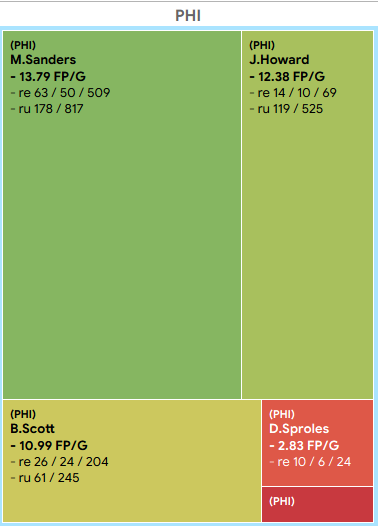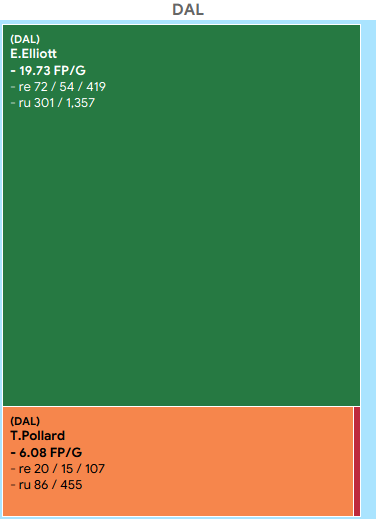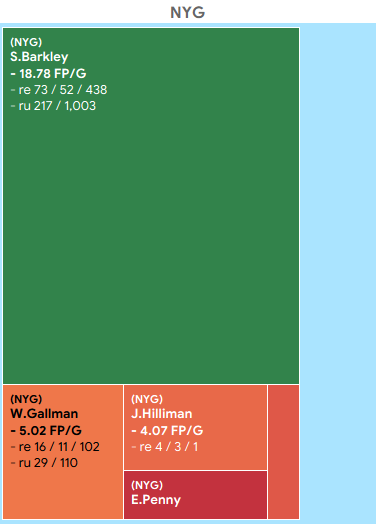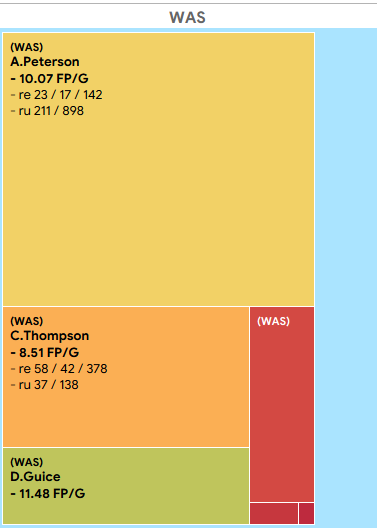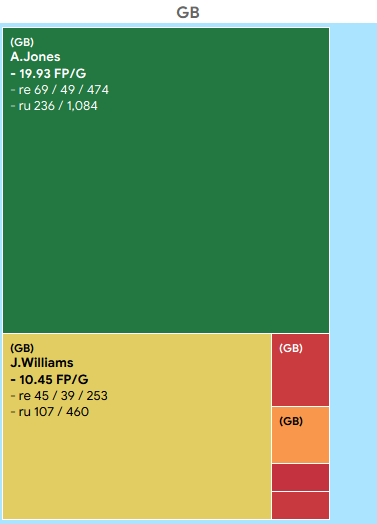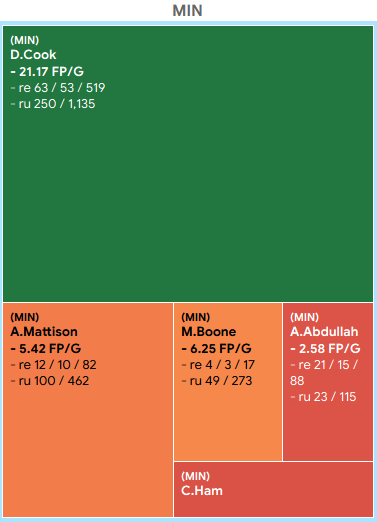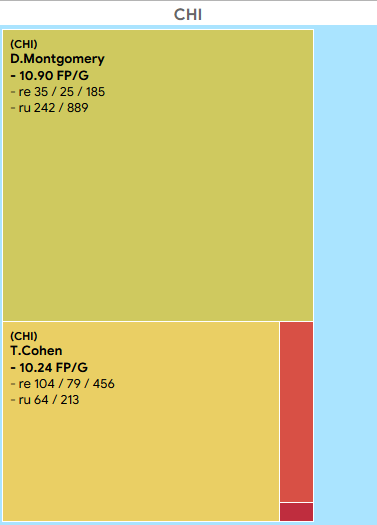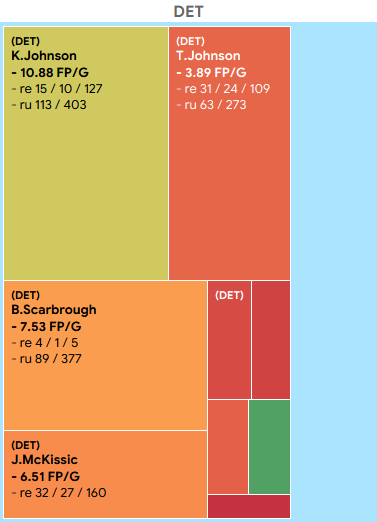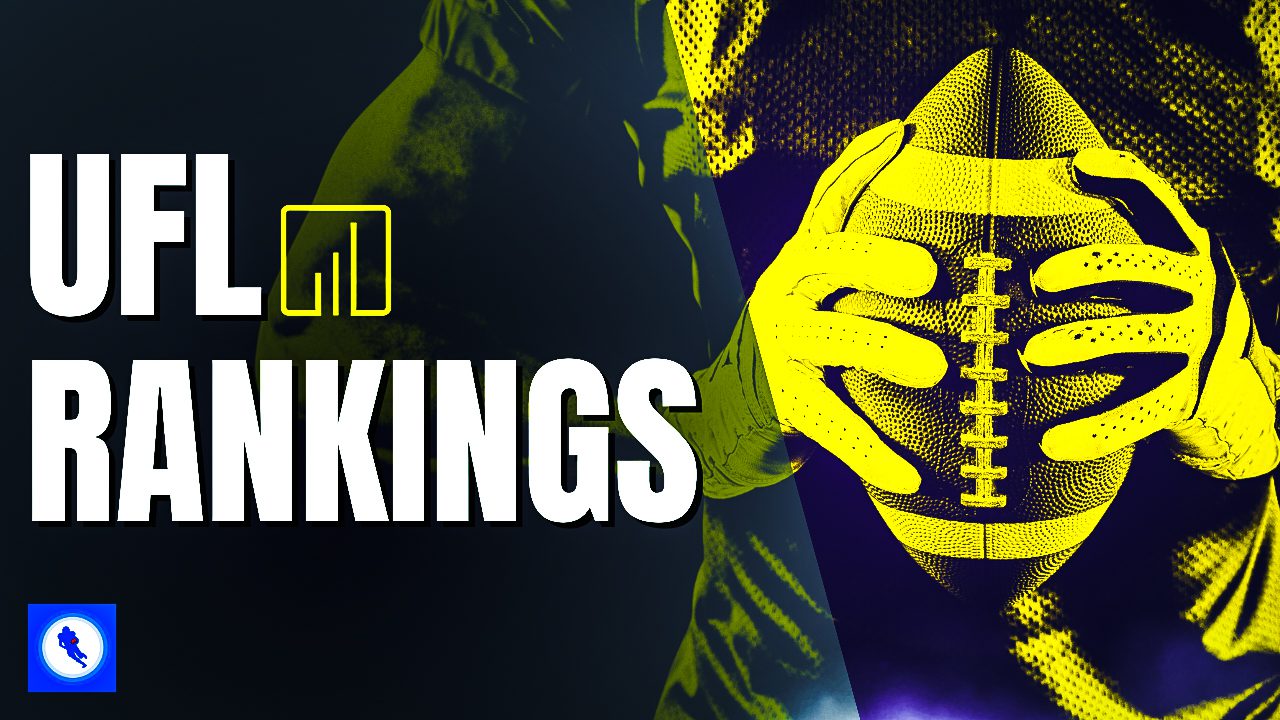Antonio Losada looks at last season's running back usage and fantasy impact for each of the 32 NFL teams. He tackles both the NFC East and NFC North franchises this time around.
With the season over and real-life free agency and April's NFL draft ahead of us, it's time to look at how each team split their targets and carries (both of them combined in what is called opportunities; sometimes it's receptions instead of targets, but I wanted to look at the overall volume and total chances instead) among their available rushers. Not every team operates in the same way at the time of splitting the passes that the leading quarterback throws to his running mates, nor how it handles the ball carries, and that has a great impact on the fantasy points any given player can get every week. Knowing who is getting used/targeted the most and who is getting the most of his opportunities in each offense is key to acquire the best possible fantasy football players.
In this series, I will be covering each of the eight NFL divisions, two at a time, presenting the teams that are part of them and the running backs that were part of those teams in 2019. To present those teams and players I use a set of easy-to-read charts: treemaps. The graphics will hold all of the players of each team, the size of each box corresponding with the number of targets+carries (percentage among teammates) he saw during the season and the color related to the fantasy points per game (PPR-format leagues) he finished with at the end of the year. Also, the width of the full graphic represents how many total opportunities (targets+carries; combining those of every rusher) were awarded to running backs by the team compared to the rest of the teams in their division (the empty space in blue to the right, the fewer targets+carries were used by rushers of such team).
Just to make things as clear as possible, I will add a little personal blurb on each team and how they performed in terms of RB usage and impact during the 2019 season. Let's break things down, this time covering the NFC East and NFC North eight teams!
Be sure to check all of our fantasy football rankings for 2025:- 2025 fantasy football rankings (redraft)
- Dynasty fantasy football rankings
- 2025 NFL rookie fantasy football rankings
- Best ball fantasy football rankings
- Quarterback fantasy football rankings
- Running back fantasy football rankings
- Wide receiver fantasy football rankings
- Tight end fantasy football rankings
- Philadelphia Eagles
- Miles Sanders came and conquered. The rookie became the clear No. 1 guy for the Eagles in the rushing department getting as many as 47.4% of the opportunities on offense in his first professional season, returning even more points than expected (49.9%).
- Jordan Howard was the RB2 of the team with a great 31.2% opportunity share mostly based on his work on the ground, as his pass-catching abilities were nothing to be too proud of.
- Good season by Boston Scott on low usage (12.4%) returning 14.8% of the total fantasy points.
- Dallas Cowboys
- Tony Pollard looked great until he didn't. Had Ezekiel Elliott held out for the season or at least a bunch of games he would have probably seen his numbers boosted, but Elliott was on the field by Week 1 so he couldn't gain anything.
- Elliott finished the year with an aligned usage and return of points, getting 77.5% of the chances and returning 77.6% of the points.
- In his 15 games, Pollard got 22% and 22.4% of the chances and points respectively. Not a heavy usage, but at least on par with the expected outcomes.
- New York Giants
- Saquon Barkley missed time due to injury and everybody jumped on Wayne Gallman. Too bad for him, the usage was still very limited (11.3% of the total opportunities) and the return wasn't too great either.
- Saquon finished with 72.5% of the total chances and bested that mark in terms of fantasy points to his name with 75.2% of the total going his way.
- Washington Redskins
- Veteran Adrian Peterson got the bulk of the load in Washington's backfield (55.7% opportunity rate) and obviously returned the most points (46.3% of them), but he wasn't the most productive rusher.
- Derrius Guice came back from a 2018 knee injury but sadly he could only stay healthy and take part in seven games. That was enough to see him average the most FP/G of all Washington's players and return 17.6% of the points on just 12.4% of the backfield's opportunities.
- Chris Thompson swung between RB2 and RB3 roles and that helped him get 22.6% of the opportunities while averaging a close production to that of the other two leading rushers.
-
Green Bay Packers
- Aaron Jones was everything Green Bay could ask for and then some. Fantasy owners were a bit frustrated with Jamaal Williams taking opportunities from him but at the end of the day, Jones got 62.2% of them and returned 64.5% of the points, so he more than made up for it all.
- Williams would have thrived on any other team, as he did as a No. 2 rusher in Green Bay getting a solid 31% of the chances and returning a similarly good 29.6% of the total points.
- Minnesota Vikings
- We finally got to see a healthy Dalvin Cook and well, did he cook. On "just" 56.3% of the total opportunities, he was ultra-efficient and returned 60% of the backfield's total points.
- Great season by rookie Alex Mattison, who got 20% of the chances and returned 14.1% of the points.
- Mike Boone was pretty solid in his eight games, too, getting 10% of the team's points by himself.
- Chicago Bears
- Tarik Cohen might not know how to run with a ball, but his pass-catching prowess helped him reaching David Montgomery's levels of production on a much lower opportunity share (36.1% to Montgomery's 59.4%).
- Montgomery returned 49.7% of the total points while Cohen got 46.7% of them. It all came down, again, to the latter's pass-catching abilities as the PPR-format rewarded that side of the game a lot for him.
- Detroit Lions
- A complete mess of a backfield.
- Only Ty Johnson played the full 16-game schedule, getting 21.9% of the opportunities over the season and returning a virtually equal 21.6% of the points.
- Kerryon Johnson was the clear No. 1 rusher of the team, as in just eight games he still led the backfield in opportunity share (29.8%) and points share (30.3%).
- Kudos to J.D. McKissic, who logged just 12.8% of the opportunities and still returned 20.4% of the fantasy points of the team in his nine games.
More Fantasy Football Analysis
 RADIO
RADIO








